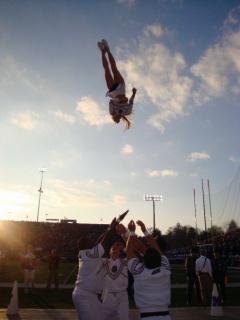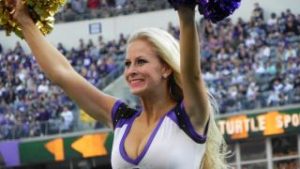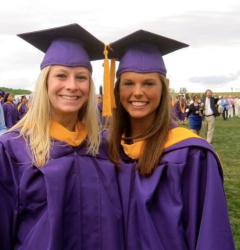Meet our newest Science Cheerleader , Rachel: a Baltimore Ravens cheerleader and physical therapist.
 Why science?
Why science?
Rachel: I was always a math/science kid in school and when I was a sophomore in high school I had an injury that could have hindered my athletic career. Fortunately the orthopedic doctors had me wear a brace which healed my stress fractures, and I was able to continue in sports. This is when I really got interested in the medical field. Now I have a Bachelor’s degree in Health Science from James Madison University (JMU)–GO DUKES!! (I especially LOVED my course-anatomy and physiology classes where I learn all the parts of the body and how they work.) I’m planning to return to school to earn a Doctorate of Physical Therapy.
Why cheerleading?
Rachel: I actually didn’t become a cheerleader until my junior year of high school. I cheered with Atlee High School for 2 years, and then went to JMU and tried out for the Varsity cheerleading squad and cheered there for 4 years. After graduating, I had a whole year off from cheerleading and it drove me crazy!! I realized I truly missed this part of my life and had some friends on the Ravens team so I decided to try out.
Describe a typical day for you.
A typical day at work begins early and I help patients complete their exercise program. I monitor and teach, while also performing ultrasounds and electrical stimulation therapy techniques. I have a long drive to the 3-hour-long cheering practice!
Best part of your day job?
Rachel: The best part of my day job is helping a patient achieve and do an activity they never thought they could. I hear “I can’t do that” a LOT, and I hate it, so I help them to realize they CAN do it and it’s very rewarding.
 Do you feel cheerleading helps or hinder your career aspirations?
Do you feel cheerleading helps or hinder your career aspirations?
Rachel: The ONLY time I ever felt stereotyped as a cheerleader was in high school. I was taking a Physics course and I fit the typical cheerleader status being blonde and outgoing. When my parents went for a parent-teacher conference to meet my teacher, he apologized to them. He said he did stereotype me as a dumb-blonde cheerleader but that he was wrong and must apologize for it. He told my parents I was too smart to be in the standard physics class and should be in the Advanced Placement physics class. This made me feel very proud of myself and after this I did have not had too many issues with stereotypes.
Do you have any advice for youngsters who might feel torn between following one dream and following another?
Rachel: Never Never NEVER give up on your studies or career dreams for cheerleading. If you want something bad enough, you will achieve it. Cheerleading should help discipline you so you can set yourself up for success. I knew I always had to get my work done before practice or I couldn’t go. Cheerleading is definitely important but you need to learn to manage your time so you can both practice and complete your work with your best efforts. It is definitely hard work to manage, but always stay on top of your career. You can always find ways to still be involved with cheerleading and you need that career because you cannot be a professional cheerleader for your whole life. Most importantly, give 110% at everything you do. Never give up, and become the best. Once you’re there, help others become the best with you.
 Best cheerleading experience?
Best cheerleading experience?
Rachel: Definitely the first regular season home game against the Steelers! The energy in the crowd was amazing and we won!
Best science-related experience?
Rachel: Definitely when I proved my high school Physics professor wrong and showed him how smart I really was!
What’s one thing people might find especially surprising about you?
Rachel: Hmm…people might find it surprising that I only cheered for 6 years before cheering for a professional team. I also had 2 stress fractures on my spine which thankfully healed and allowed me to continue in athletics—and before this I was a gymnast!
Why do you want to be a Science Cheerleader?
Rachel: I want to be a Science Cheerleader because I love science and cheerleading! They are both passions of mine. I also don’t want ‘science’ to become stereotyped as a male’s field because I think that women have the smarts to change this. As a cheerleader I think it’s important in the health field to be a knowledgeable, cheerful, team player!


Rachel,
Wow. I’m male and I flunked the standard physics class in high school. I enjoyed learning the astronomy but when it got to the math, I got befuddled and my head spun really good! Physics is simply too mentally rigorous for me and I felt like a blockhead! This site presents copious evidence that beautiful women cheerleaders can have much greater intellectual ability than most men. I’m far from a Ph.d candidate because my thinking ability is much more limited. Congratulations, Rachel. Go for that Ph.d!